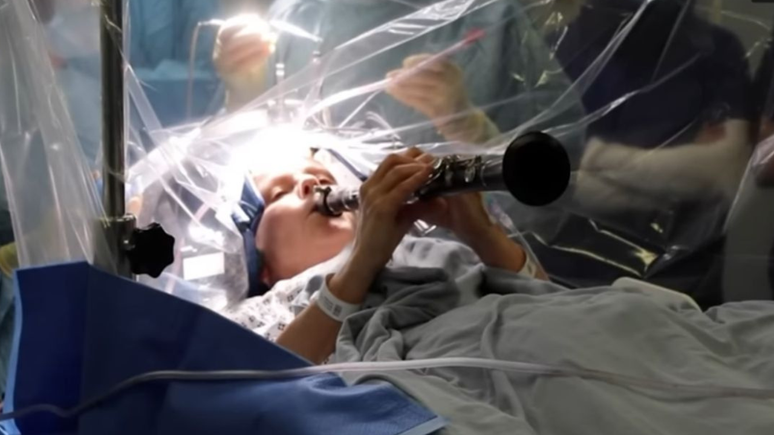Patients played instruments during brain tumor removal operations and deep brain stimulation procedures
Last week, images of the English Denise Bacon Playing the clarinet during brain surgery has attracted attention on social media. After the fallout, people from various parts of the world began to wonder why a patient remains awake during such a delicate procedure and whether this practice poses no health risks.
Understand the use of instruments in surgical procedures
According to experts, brain procedures are, by nature, potentially dangerous and can cause everything from common complications, such as bleeding and headaches, to impacts on cognition. However, these risks do not necessarily increase when the surgery is performed with the patient awake. On the contrary, light sedation, indicated in case of tumors or deep brain stimulation (ECP), can contribute to greater precision during operation.
“You will receive anesthesia in your head so you will not feel pain from the incision, as well as sedation for light sleep. Next, the surgeon and anesthesiologist will wake you up during the surgery and ask you to perform certain tasks. You may need to talk, move a part of your body, look at objects, or remember information. This process helps the surgeon avoid important areas of the brain during the surgery.”explains an article by Cleveland Clinica North American academic medical center.
In Bacon’s case, diagnosed Parkinsonthe technique also contributed to the effectiveness of the treatment, which aimed to recover his ability to move. This is because, by playing the instrument during the four hours of DBS, it was possible to precisely adjust the position of the electrodes in his brain. This ensured that neural activities returned to normal functioning.
“I remember that my right hand was able to move much more easily once the stimulation was applied, and this in turn improved my ability to play the clarinet. I was happy,” said Denise, in an interview with Reuters.
Progress improves the recovery process
According to professionals, the presence of musical instruments in operating rooms also reduces the risk of serious consequences. Additionally, it can provide better treatment results and faster recovery. An example is the experience of an Italian saxophonist who, in 2022, had a brain tumor removed and was discharged just three days after the operation.
“Constant interaction during the procedure allows for real-time adjustments, ensuring better outcomes in both clinical and functional aspects. This approach reflects advances in modern neurosurgery, which combines technology, precision and patient-centered care. Awake surgery is an example of how medicine can evolve to offer more effective and personalized solutions for challenging neurological conditions,” said the neurosurgeon Mario Henrique Santanaon your website.
Source: Terra
Ben Stock is a lifestyle journalist and author at Gossipify. He writes about topics such as health, wellness, travel, food and home decor. He provides practical advice and inspiration to improve well-being, keeps readers up to date with latest lifestyle news and trends, known for his engaging writing style, in-depth analysis and unique perspectives.





![A Better Life Preview: What’s in store for Tuesday, November 4, 2025 Episode 456 [SPOILERS] A Better Life Preview: What’s in store for Tuesday, November 4, 2025 Episode 456 [SPOILERS]](https://fr.web.img2.acsta.net/img/e0/d0/e0d004677b72ee91fa84c48063af3e15.jpg)


